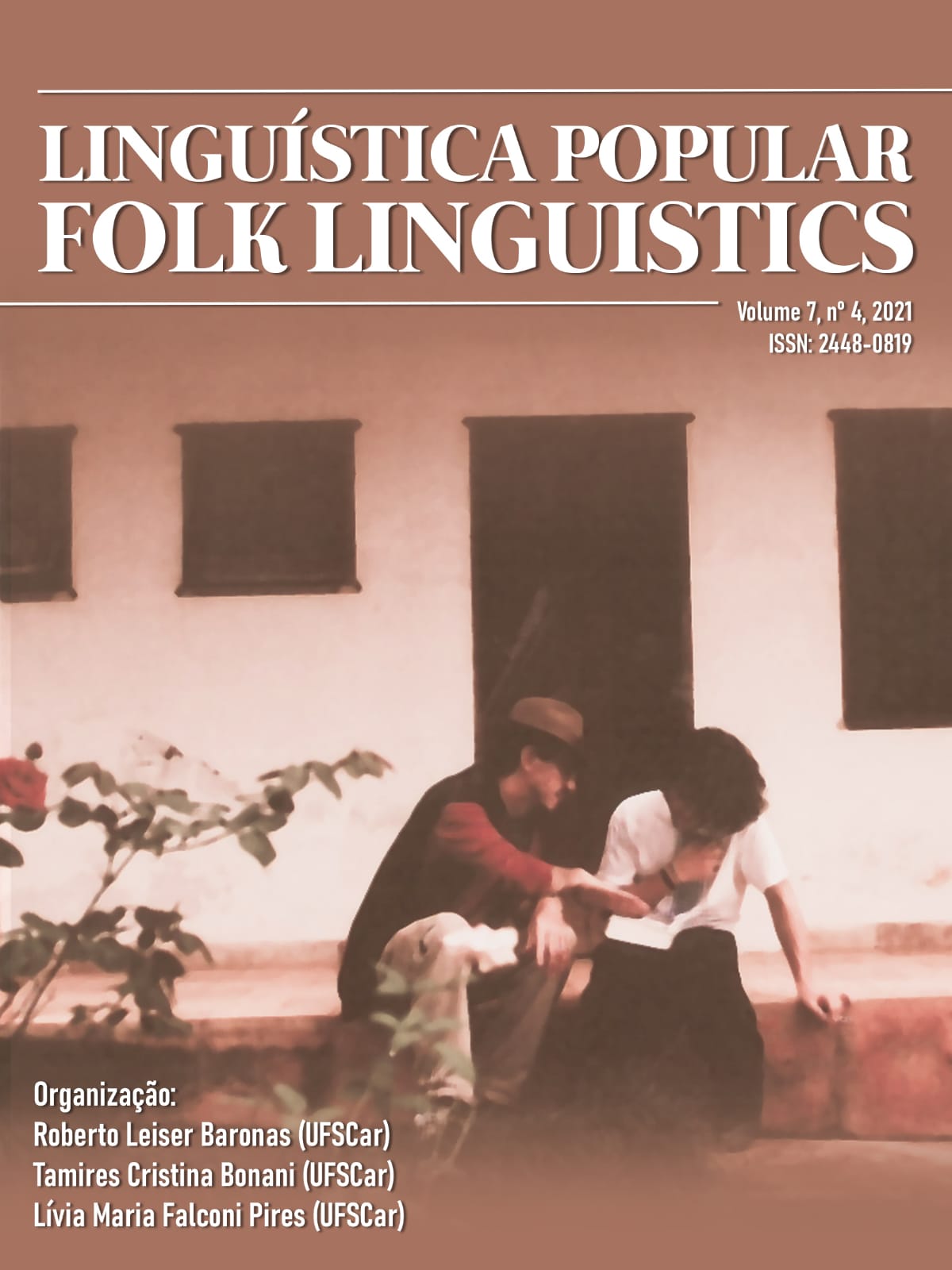Folk Nurc? Uma proposta de análise em linguística popular
Abstract
The aim of this paper is to reveal how folk data are recurrent (and can be observed) in the Norma Urbana Culta (NURC) Project, started in the late 1960s in the Brazilian cities of Recife, Salvador, Rio de Janeiro, São Paulo and Porto Alegre. Our hypotheses indicate that, although the NURC Project has not collected linguistic data aiming specifically to analyze the manifestations of the speakers about the language they use, these manifestations can be verified in the most diverse communication situations: there are a series of comments made by (and between to) interviewees and researchers who can be characterized as non-specialized manifestations about language, that is, folk knowledge about linguistic practices and theories. Therefore, we mobilized a theoretical set still under construction in Brazil known as Folk Linguistics (NIEDZIELSKI; PRESTON, 2003, PAVEAU, 2020, GONÇALVES, 2021), centered on the common speaker, in which non-specialists comment on their own language (or about the speech of other members of a given speech community). Finally, we highlight the importance of research carried out in Brazil within the scope of the NURC Project, especially if integrated with recent discussions on Folk Linguistics.
References
ANTOS, G. Laien-Linguistik. De Gruyter, 2011.
BAGNO, M. Dicionário crítico de sociolinguística. Parábola, 2017.
BARONAS, R. O amargo da língua de Bolsonaro: discurso e linguística popular. Grácio Editor: Portugal, 2021.
BARONAS, R.; CONTI, T. Notas sobre a possibilidade de um trabalho no carrefour epistemológico entre a linguística popular e os estudos do discurso. Fórum Linguístico, v. 16, n. 4, p. 4285-4294, 2019.
BECHARA, E. Moderna gramática portuguesa. Editora Nova Fronteira & Editora Lucerna, 2009.
CARDONA, G. Henry Hoenigswald. Biographical Memoirs: Volume 89, v. 89, p. 181, 2008.
CASTILHO, A. T. DE. Gramática do Português Brasileiro: fundamentos, perspectivas. Cadernos de Linguística, v. 2, n. 1, p. 01-17, 26 Apr. 2021.
DE SAUSSURE, F. Curso de linguística geral. Editora Cultrix, 2008.
DOURY, M. «Ce n’est pas un argument!» Sur quelques aspects des théorisations spontanées de l’argumentation. Pratiques. Linguistique, littérature, didactique, n. 139-140, p. 111-128, 2008.
GONÇALVES, M. On Mario de Andrade’s Folk Linguistics. Cadernos de Linguística, v. 2, n. 4, p. e490, 27 Aug. 2021.
HOENIGSWALD, H. M. A proposal for the study of folk-linguistics. In: Sociolinguistics. De Gruyter Mouton, 2015.
NIEDZIELSKI, N. A.; PRESTON, D. R. Folk linguistics. Walter de Gruyter, 2003.
NIEDZIELSKI, N. A.; PRESTON, D. R. Pragmática Popular. In: BARONAS, R.; GONÇALVES, M.; SANTOS, J. (org.). Linguística popular: contribuições às ciências da linguagem. Araraquara: Letraria, 2021.
OLIVEIRA Jr., M. NURC Digital: Um protocolo para a digitalização, anotação, arquivamento e disseminação do material do Projeto da Norma Urbana Linguística Culta (NURC). CHIMERA: Romance Corpora and Linguistic Studies, v. 3, p. 149-174, 2016.
OLIVEIRA Jr., M. (org.) NURC – 50 anos (1969-2019). Editora: Parábola Editorial, 2019.
PAVEAU, M. Linguística folk: uma introdução. BARONAS, R.; CONTI, T.; COSTA, J. (Org.). Araraquara: Letraria, 2020.
SARDINHA, T. B. Lingüística de corpus: histórico e problemática. Delta: documentação de estudos em linguística teórica e aplicada, v. 16, p. 323-367, 2000.
SWIGGERS, P. Languages, Language History, and the History of Linguistics: From Structure to Transformation, Between Europe and America. An interview with Henry Hoenigswald. Orbis Supplementa, Louvain-Paris, Peeters, p. 41–59, 1997.
Downloads
Published
How to Cite
Issue
Section
License
Os autores concordam com os termos da Declaração de Direito Autoral, que se aplicará a esta submissão caso seja publicada nesta revista (comentários ao editor podem ser incluídos a seguir).




